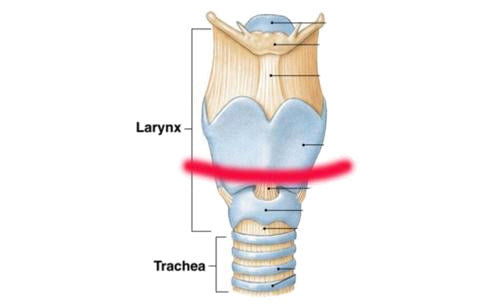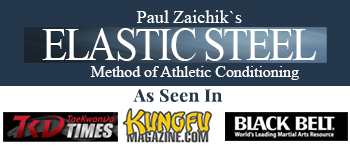Throat Strikes For Self-Defense: Civilian Vs Military - From A Legal Point of View
Throat Strikes, the legal aspect of different strikes

After eye strikes and groin strikes, the throat strikes are probably the biggest go-to technique in the self-defense community.
Most traditional martial arts styles teach some form of these techniques.
Today two variations are discussed. The “Y” strike or the “web” strike and the thumb strike.
While both strikes seem simple to execute, I recommend using caution. The webs strike requires strong, stabilized wrist and conditioned fingers and thumbs. While the thumb strike requires conditioned thumb. If the hand is positioned wrong and the contact is made with thumb or fingers at the wrong angle, injuries are very possible. This, of course, will put the defender in a very bad position.
This article speaks for the practitioners who have taken the appropriate steps to train for the strikes. Meaning the hands, wrist, and fingers were well conditioned. Strikes have been practiced for automation and accuracy.
Two Points of View
In the self-defense community, there are two rather conflicting schools of thoughts:
- School One: Do as much damage as you need to survive. It’s better to be judged by 12 than carried by 6.
- School Two: Don’t practice the techniques you would not want to use. If you practice something that can do serious damage, you will probably use it. If you use it, you may face hefty criminal or civil penalties.
The choice of technique argument has always existed. During my own training, I have seen people talk about the amount of reasonable force frequently. For example in the blade community, a common question focuses on questions like these;
If there is only one chance to do a surprise slash, should it be to the shoulder or the throat? On the shoulder won’t take a life, but may not be enough to stop the attacker. Deepthroat slash will be enough to stop the attacker, but may become a legal nightmare.
The same argument often applied to weaponless combat and techniques, such as knee attacks. A sidekick or oblique kick to the knee, at the right angle and at the right force can break the knee. While a roundhouse to the thigh will not break the leg, but may not be enough to stop the attack.
Master the Techniques You Want to Use
Of course, all these questions come from an assumption. The assumption is that all the techniques are mastered at such a high level, that when deployed, they will do the damage they intend to do.
So the Civilian/Military classification comes from the potential repercussions perspective. Civilians are not expected to kill in combat, and military personnel are. Out of the two, the civilians are expected to exercise restraint and often are praised for it.
The Two Throat Strikes
Ok, back to throat strikes. If two strikes are compared on the target and point of impact, we can easily see why one will do so much more damage than the other. (Providing that the same amount of force is used)
Web Strike or “Y” Throat Strike

The web strike usually is aimed and lands on the Thyroid Cartilage. Adam’s apple is the protrusion of this structure. It protects from impact. It won’t protect from severe impacts, such as a strong sidekick, but it offers some protection. At the same time, the force of the “Y” strike is distributed, through a surface area between thumb and index finger. A combination of hard cartilage protection and force distribution, offer an ability to withstand a mild to moderate impact.
Thumb Throat Strike

A thumb strike’s impact is aimed at the tracheal cartilages. This is a rather weak collection of soft tissue. The point of impact is less than the size of a penny. If a thumb throat strike is made at the same force as the web strike, the impact is at least 5-6 times stronger due to a smaller area. It is also at least 3 times stronger due to weaker protection factor. This means 15x the force.
The common counter-argument for the danger of thumb strikes is combatant control of force. This means, when you strike at the weak part of the throat, you simply don’t hit hard. However, it this realistic? When someone is trying to hurt you, and you have a shot at his throat… Do you hold back? Can you control yourself when in danger and under adrenaline? What if the other person moves his body toward you? The force of impact will be much stronger now and beyond your control.
The Court looks at the damage done, not technique.
The judge won’t base his ruling solely on what the attacker was hit with. What he will look at closely is amount damage done. I know a case when a martial artist killed another person with a punch to the head. He went to jail. Would he have gotten the same sentence if the punch only dropped the other guy? Probably not.
Don’t rely on “self-defense” situation or “I was only trying to defend myself”
The issue that often comes up is, what is a “self-defense” situation?
Is an altercation in a bar or a mall a “self-defense” situation?
Is a kid bullied in school or in the neighborhood a “self-defense” situation?
Judges usually expect people to walk away or call authorities.
“He got in my face and I had to defend myself is a “self-defense” situation to you, but may not be so to someone else.
Just because the force you used is completely justified to you, does not mean it is to someone else. There are countless cases of kids getting feed up and hurting a bully, who tormented them. If the result was severe damage or death, they were held responsible almost every time.
Know the laws, be aware, be safe!
Point of Impact Strength and Flexibility Development
This program teaches how to develop flexibility and corresponding strength in the wrist and forearm to properly and safely position the hand for the palm strike.
Here is the full explanation of the program.
Palm vs Fist
The palm is not used as often as the fist in most styles of martial arts. Usually a situation as well as individual preference dictates the choice between the palm and fist, both have their advantages and dis-advantages.
Some advantages of the palm strike are as follows:
- Padded striking surface, thus less chances of injury.
- Less joints to stabilize and thus less force lost upon impact.
- Can be performed at a closer distance.
Of course there are dis-advantages as well, compared to the fist. Some of them are listed below:
- Larger surface area. Thus less penetration and harder to sneak in.
- Less reach.
- Flexibility and strength of the wrist is needed to execute properly.
Of course this is not a complete list.
Full Power
To get full power from the straight palm strike, one needs to keep the forearm in line with the target. This of course calls for at least 90 degree angle in the wrist. (the hand must be vertical as the forearm is horizontal)
More than 90% of people don’t have this flexibility. This means that to keep the palm in the right position, the forearm position is adjusted to partial incline. This lead to biomechanically disadvantageous strikes, causing less force to be delivered than during the correct strike.
Thus flexibility development alone, increases the force delivered by an open hand significantly.
With flexibility must come strength. The strength comes in two parts.
- To prevent injury upon impact.
- To maintain the correct hand position through out the strike.
In this program. We take you through everything required for the proper strike.
- Conditioning
- Flexibility
- Strength
Do you need this program?
Here is how to check: place your forearm on the table palm down. And lift your hand up (extend the wrist joint).
Is your palm vertical?
- If so, you don’t need this program.
- If you palm is not vertical (your finger tips are not directly over your wrist) You need this program.
© ElasticSteel Corp., EasyFlexibility, Paul Zaichik, et. El., 2022. No part of the materials available through ElasticSteel.com, EasyFlexiiblity.com, site may be copied, photocopied, reproduced, translated or reduced to any electronic medium or machine-readable form, in whole or in part, without prior written consent of Paul Zaichik EasyFlexibility.com, Elasticsteel.com.. Any other reproduction in any form without the permission of Paul Zaichik EasyFlexibility.com, Elasticsteel.com is prohibited. All materials contained on this site are protected by United States copyright law and may not be reproduced, distributed, transmitted, displayed, published or broadcast without the prior written permission of Paul Zaichik, EasyFlexibility.com, Elasticsteel.com.



